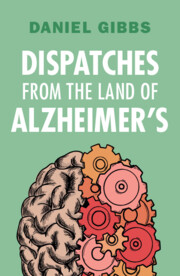Book contents
- Dispatches from the Land of Alzheimer’s
- Reviews
- Dispatches from the Land of Alzheimer’s
- Copyright page
- Dedication
- Lost in Thought
- Contents
- Acknowledgments
- Prologue
- 1 Physician Heal Thyself
- 2 Evaluating New Advances in Alzheimer’s Research
- 3 Alzheimer’s Dementia or Alzheimer’s Disease
- 4 The First Patient with Alzheimer’s Disease
- 5 Kidnapped in Kinshasa
- 6 Smell, Disgust, and Alzheimer’s
- 7 Apolipoprotein-4 (APOE-4)
- 8 Lost in the Fog of Alzheimer’s
- 9 My Father’s “Stuff”
- 10 Face Blindness during a Pandemic
- 11 Biomarkers for Alzheimer’s Disease
- 12 Olfactory Impairment in Covid-19 and Alzheimer’s
- 13 Alzheimer’s Disease and Work
- 14 Crossword Controversies
- 15 Can Loneliness Increase Risk for Dementia?
- 16 Excessive Laxative Use and Dementia
- 17 Dog Dementia (Canine Cognitive Dysfunction)
- 18 The Possible Role of Brain Inflammation in Alzheimer’s Disease May Be More Significant in APOE-4 Carriers
- 19 Surprisingly Good News about the Acetylcholinesterase Inhibitors (Donepezil, Rivastigmine, and Galantamine)
- 20 More about the Importance of Exercise
- 21 Rolling on the River
- 22 The MIND Diet Revisited
- 23 My Photographs, Then and Now
- 24 Does Cataract Surgery Really Decrease the Risk of Dementia?
- 25 Hearing Loss, Aphasia, and Dementia
- 26 To Sleep, Perchance to Dream
- 27 The Amyloid Hypothesis Is Not Dead, but It May Be Gasping for Breath
- 28 Could Lecanemab Offer a Ray of Hope?
- 29 A Fatal Case of Multiple Brain Hemorrhages Associated with Lecanemab
- 30 Cerebral Amyloid Angiopathy (CAA)
- 31 Hitting the Sweet Spot in the Spectrum of Alzheimer’s Disease for Future Trials of Anti-Amyloid Medications
- 32 Disappointing Results of Two Human Trials of Monoclonal Antibodies in Parkinson’s Disease
- 33 Repurposing Old Drugs for Alzheimer’s Treatment
- 34 Writing While Impaired
- 35 Spreading the Word
- 36 Saying Goodbye to Lizzie G
- 37 Amyloid and Tau PET Scans of My Brain
- 38 Running on a Field of Dreams
- 39 Living in the Moment with Alzheimer’s
- Index
- Plate Section (PDF Only)
- References
3 - Alzheimer’s Dementia or Alzheimer’s Disease
What’s the Difference and Why Should We Care?
Published online by Cambridge University Press: 19 January 2024
- Dispatches from the Land of Alzheimer’s
- Reviews
- Dispatches from the Land of Alzheimer’s
- Copyright page
- Dedication
- Lost in Thought
- Contents
- Acknowledgments
- Prologue
- 1 Physician Heal Thyself
- 2 Evaluating New Advances in Alzheimer’s Research
- 3 Alzheimer’s Dementia or Alzheimer’s Disease
- 4 The First Patient with Alzheimer’s Disease
- 5 Kidnapped in Kinshasa
- 6 Smell, Disgust, and Alzheimer’s
- 7 Apolipoprotein-4 (APOE-4)
- 8 Lost in the Fog of Alzheimer’s
- 9 My Father’s “Stuff”
- 10 Face Blindness during a Pandemic
- 11 Biomarkers for Alzheimer’s Disease
- 12 Olfactory Impairment in Covid-19 and Alzheimer’s
- 13 Alzheimer’s Disease and Work
- 14 Crossword Controversies
- 15 Can Loneliness Increase Risk for Dementia?
- 16 Excessive Laxative Use and Dementia
- 17 Dog Dementia (Canine Cognitive Dysfunction)
- 18 The Possible Role of Brain Inflammation in Alzheimer’s Disease May Be More Significant in APOE-4 Carriers
- 19 Surprisingly Good News about the Acetylcholinesterase Inhibitors (Donepezil, Rivastigmine, and Galantamine)
- 20 More about the Importance of Exercise
- 21 Rolling on the River
- 22 The MIND Diet Revisited
- 23 My Photographs, Then and Now
- 24 Does Cataract Surgery Really Decrease the Risk of Dementia?
- 25 Hearing Loss, Aphasia, and Dementia
- 26 To Sleep, Perchance to Dream
- 27 The Amyloid Hypothesis Is Not Dead, but It May Be Gasping for Breath
- 28 Could Lecanemab Offer a Ray of Hope?
- 29 A Fatal Case of Multiple Brain Hemorrhages Associated with Lecanemab
- 30 Cerebral Amyloid Angiopathy (CAA)
- 31 Hitting the Sweet Spot in the Spectrum of Alzheimer’s Disease for Future Trials of Anti-Amyloid Medications
- 32 Disappointing Results of Two Human Trials of Monoclonal Antibodies in Parkinson’s Disease
- 33 Repurposing Old Drugs for Alzheimer’s Treatment
- 34 Writing While Impaired
- 35 Spreading the Word
- 36 Saying Goodbye to Lizzie G
- 37 Amyloid and Tau PET Scans of My Brain
- 38 Running on a Field of Dreams
- 39 Living in the Moment with Alzheimer’s
- Index
- Plate Section (PDF Only)
- References
Summary
I now have a special interest in Alzheimer’s disease. For nearly 25 years, I practiced general neurology in Portland, Oregon. Some of my patients had dementia, a progressive neurological disorder that causes severe cognitive impairment affecting memory, language, motivation, and mood, interfering with everyday activities. There are several diseases that can cause dementia, including Lewy body disease, Parkinson’s disease, frontotemporal degeneration, and vascular dementia, but Alzheimer’s disease is the most common cause, accounting for 60–80% of cases. In 2013, I retired because I had developed mild cognitive impairment (MCI) that was soon shown by biomarker testing to be due to early-stage Alzheimer’s disease. I suddenly wore two hats – that of a retired physician with a lot of experience treating Alzheimer’s disease and now a person living with the same disorder.
Keywords
- Type
- Chapter
- Information
- Dispatches from the Land of Alzheimer's , pp. 12 - 17Publisher: Cambridge University PressPrint publication year: 2024

